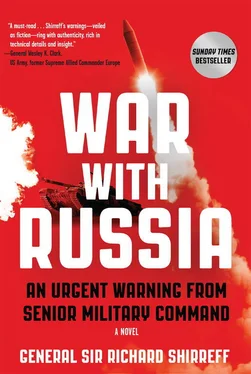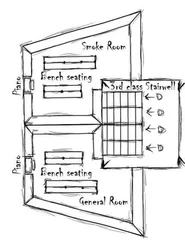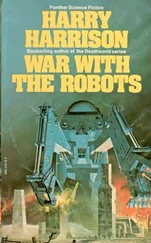“So, there was no NATO involvement?” persisted the President.
“Well, not quite, Vladimir Vladimirovich. The Americans sent a large detachment to Lielvārde Air Base to set things up for their F-16 force. The F-16s got out just in time, but the detachment of airmen joined the Latvians in the defense of the air base. They fought bravely. The survivors are now prisoners of war.”
“Make sure they’re properly treated. They’ll be useful bargaining chips if we have to negotiate… as we may have to, if this triggers NATO into reacting.” The President looked thoughtful, doubtless trying to ponder the consequences of this unexpected and unwelcome bit of news. Then he changed the topic. “You said they fought bravely. What about our losses?”
The Defense Minister, once again in his heavily bemedaled uniform, decided to push himself forward, doubtless keen to share in the glory of the moment. “Insignificant among the airborne infantry, Vladimir Vladimirovich,” he asserted.
An interesting statement , thought Komarov, because just before coming up to the bridge, he had heard that there had been significant losses among the attackers, both at Lielvārde and the international airport at Riga.
“What exactly do you mean by insignificant, Alexandr Borisovich?” asked the President.
The Defense Minister opened his mouth, but it was clear he did not know the answer, so Gareyev stepped back in.
“First reports indicate at least ten-per-cent casualties, which is heavy. Around forty killed in action and over two hundred and fifty wounded. Although overwhelmed, the Latvians fought like devils,” he said, with a soldier’s respect for a tough adversary.
“Anything else?”
This time the Defense Minister did have his facts to hand as he spoke again. “The Air Force lost two Su-25 Frogfoots, shot down by a US-piloted F-16 over Lielvārde.”
Komarov noted that the President looked angry at this news and he knew just why. Although a veteran of Soviet times, so by no means a state-of-the-art aircraft, the Frogfoot was a highly capable machine and they could ill afford to lose any this early in the game.
“Tell me the American was shot down.”
“No, Vladimir Vladimirovich. He got away.”
“Two of our best fighters for none of theirs. You told me that our planes were every bit as good as theirs…”
“They are, Vladimir Vladimirovich. But when planes are matched it comes down to the individual skills and war-fighting experience of the pilots. This man is an ace and—”
“You know him?” the President demanded.
“Our people intercepted his radio transmissions. We believe he is the same pilot that knocked down our plane over Donbass—”
The President held up his hand for silence and turned to look over the War Room below, the only sign of his anger the whiteness of his knuckles as his hands gripped the wooden balustrade.
Calmed, he turned. “The next time I hear about this pilot you will report his death. Whether in the air or in his bed, I don’t care which, or how. See to it.” He glared at his generals, not expecting a reply. “With regard to our infantry losses, I suppose that was foreseeable. These Latvians are no better than German peasants and never learn when they are beaten. Make sure it’s kept quiet and ensure the bodies are returned to their families in the usual way. That will keep the mothers of the soldiers off my back… And, if you want to keep your post,” he pointed at the Defense Minister, who blushed with embarrassment, “you’ll be sure of all your facts before you next open your mouth.”
Komarov knew exactly what the President was referring to. Just as during the Soviet fighting in Afghanistan, after the invasion of Ukraine, the bodies of soldiers killed in action had been returned to their families with no ceremony; in cheap plywood coffins dumped outside their apartments in the middle of the night to avoid any adverse publicity. The families were told to put up and shut up or face the consequences. Not for Russia the mawkish, morale-sapping practice of western countries: the Fallen returning with ceremony in flag-draped coffins and reported on by TV crews.
During this ill-tempered exchange Filatov had held back, but was now almost hopping from one foot to another, like a child desperate to interrupt a conversation. Finally, judging that the worst of the President’s temper was dissipated, he summoned up the courage and burst out, “Excuse me, Vladimir Vladimirovitch. Forgive me for interrupting, but I failed to give you a key detail about the damage done to the opposition.”
The President, who had turned about to walk to the War Room, stopped suddenly. “Tell me more, General,” he asked, his voice like ice.
“The other news just in is that two Su-25 Scorpions sank two NATO ships in Riga Harbor, tied up alongside,” Filatov announced, not sure whether to smile at the good news or keep his face grave, in case the President was not happy with this unexpected development. “The aircraft had orders to sink Latvian Navy ships, but initial battle-damage reports indicate that they were British and German.”
Komarov saw the Foreign Minister stiffen beside the President. “Vladimir Vladimirovitch, so much for your policy of divide and rule that you ordered me to pursue among the NATO allies,” he said, with the smooth sarcasm of a diplomat presented with the most egregious example of military incompetence. “It would be difficult to think of anything more likely to get Germany to sign up to Article Five than sinking one of her naval vessels. And to compound it, sinking a British ship as well is almost unbelievable. At one stroke the all-conquering Russian Air Force has effectively united NATO against us. Congratulations, Mikhail Nikolayevich.” He looked derisively at the Chief of the Russian General Staff, who glared back at him in fury.
The President turned to Gareyev in a rage. “I want a full report on why this happened on my desk tonight. And, if this is true, the Commander-in-Chief of the Air Force is not only relieved of his command, but he’s to be in Lefortovo Prison within the next hour. Is that clear?”
Gareyev wanted to point out that at 20,000 feet identification was not straightforward, but he also knew that the FSB had told the Air Force that the NATO ships were due in port, so he could do nothing but nod his head. “It will be done, Vladimir Vladimirovich,” he said.
“Right.” The President turned abruptly and walked toward the War Cabinet room. “Enough about Latvia and the Air Force’s efforts to unite NATO against me. I want an update on the other Baltic states and likely reactions from the Americans and NATO.”
Once seated at the cabinet table, a series of staff officers briefed the President in detail on the success of operations in Estonia and Lithuania, both now effectively under Russian control after a series of lightning strikes by airborne forces, now being backed up by amphibious landings by the Baltic Fleet on the coast of Estonia.
“And now, Viktor Anatolyevich,” said the President, turning to his deputy, “it’s over to you to reintegrate them into Russia. I want a referendum held in each country within ten days. The question you put to them is simple: do they, or do they not, want to become part of the Russian Federation. Meanwhile, their armed forces are to be disbanded. Russian speakers must, of course, stay and are to be the basis of their new security forces. Any—and that includes Russian speakers—not prepared to swear the oath of allegiance to me as President are to be deported to the gulags.”
“With pleasure, Vladimir Vladimirovich,” the urbane former Ambassador to NATO replied with a smirk. “The result will be a foregone conclusion. As Comrade Stalin used to say: ‘It’s not the voting that counts. It’s the counting that counts.’”
Читать дальше












